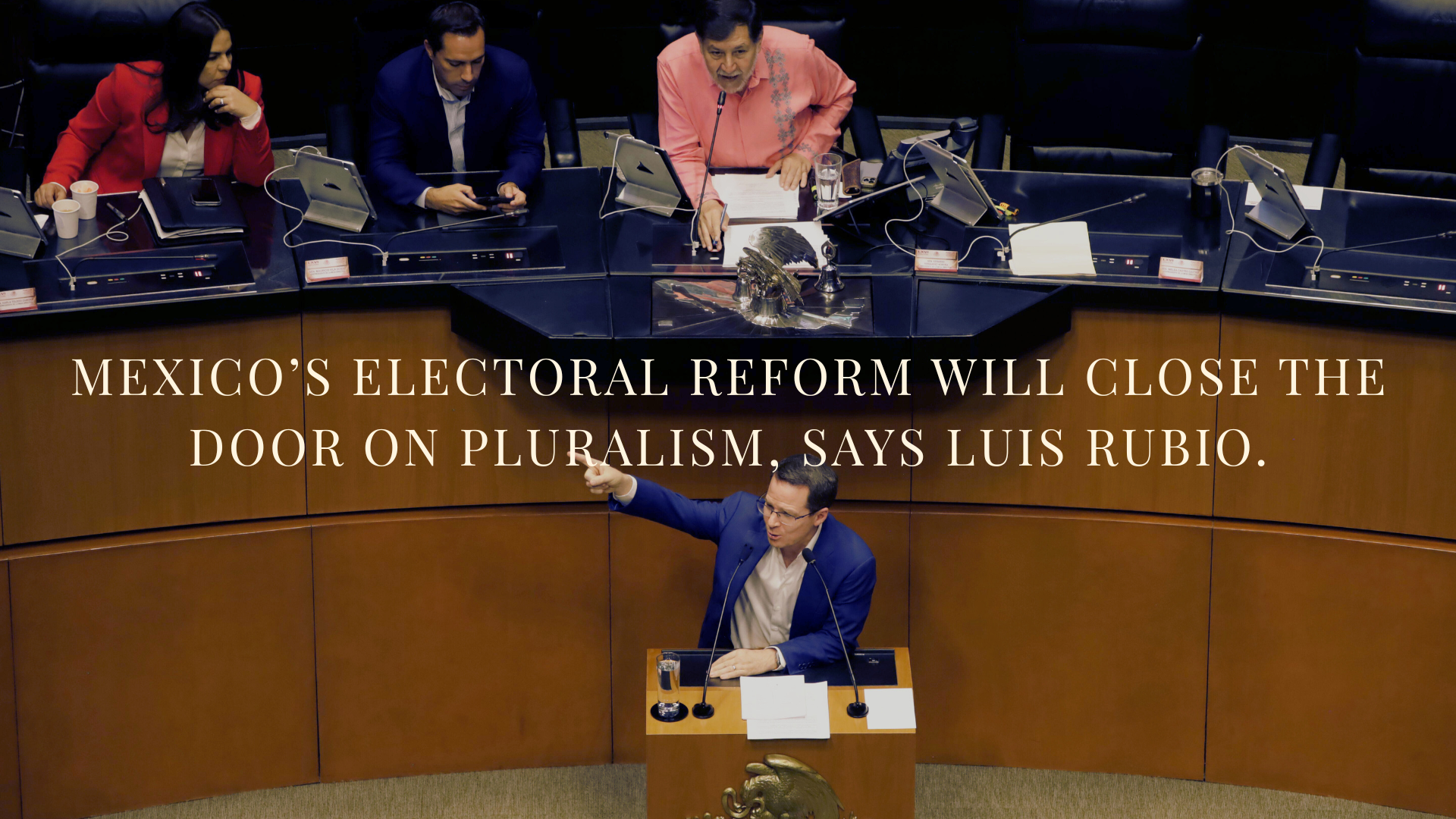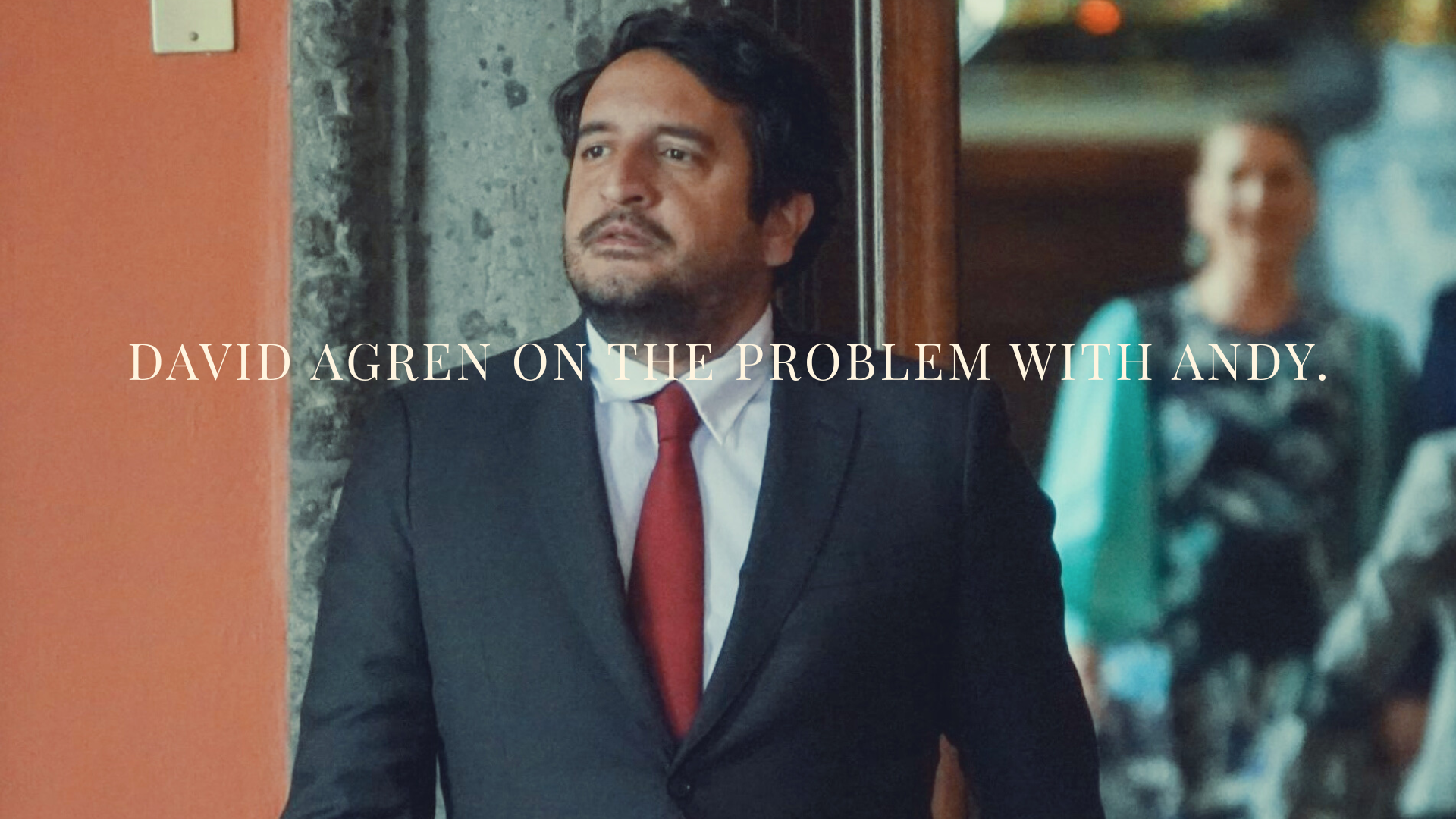
Mexico’s electoral reform will close the door on pluralism
by Luis Rubio, political analyst and Chair of México Evalúa.
President Claudia Sheinbaum has announced an electoral reform. Its details have not yet been made public, but its spirit has been clear since the beginning of the year, laid out through a series of official statements. What motivates this initiative is radically different from the logic that inspired every electoral (or political) reform since 1962, when Mexico introduced the figure of “party deputies” — in other words, opposition representatives — as a way to open space for diverse voices, oxygenate the system, and preserve political stability.
The central question is not what the reform will contain — its intent is already known — but how the two minor allies, the Green Party (PVEM) and the Labor Party (PT), will act. Without their support, passage is impossible.
From 1962 onward, every electoral reform pursued the same purpose: injecting oxygen into the political system. That was the rationale behind the 1978 reform engineered by Jesús Reyes Heroles, which gave legitimacy to left-wing parties such as the Communist Party and the Mexican Workers’ Party. Their numbers were negligible, but…

Editor’s note: Claudia Sheinbaum is not Donald Trump’s foil. She is his parallel.
by Andrew Law, editor and founder.
It’s been impossible to miss during Trump’s second term how, in corners of US media and the anti-Trump internet, President Claudia Sheinbaum is cast as his foil: a foreign leader ready to puncture his distortions about Mexico; a “Trump whisperer,” as The Washington Post called her.
The appeal is obvious. On paper she looks like the perfect counterweight: a technocratic climate scientist who governed Mexico City just as US tourists, digital nomads, and urban creatives were discovering it. But her record of exaggerations, denials, and narrative spin shows she can be every bit as casual with the truth as Trump. And this is what her foreign progressive fan club needs to understand: Claudia Sheinbaum has more in common with Trump than they think.
Take Project Portero. The US Department of Justice billed it as a bold new initiative with Mexico’s security apparatus. Almost immediately Sheinbaum denied it existed. Progressives on Bluesky (and what remains of them on X) seized on her denial as proof of another Trump lie. Yet her clarification — those police officers were traveling to Texas for a law enforcement conference — barely differed from the DEA’s announcement, just stripped of American hyperbole.
That reaction also ignored her track record. She has met virtually every Trump demand on immigration and law enforcement, militarizing Mexico’s border much as Trump has militarized the US’s. Sheinbaum insists such cooperation respects Mexico’s sovereignty, but sidesteps how it is enforced. NGOs have documented mass detentions and forced transfers of migrants to Mexico’s far south, where opportunity is scarce and insecurity high. In practice Sheinbaum has turned the whole of Mexico into Trump’s border wall.
Spin and denial extend beyond…


The Morena Pact
In 1989, a series of protests and disturbances in China culminated in the massacre at Tiananmen Square, Beijing’s central plaza. The event shook not only China, but also the outside world, which had placed its hopes on reintegrating China into the community of nations. No less important, the bloodshed threatened the country’s ongoing process of economic transformation. Gradually, internal peace was restored, and an implicit social pact was forged that became the cornerstone of the spectacular economic growth that followed. That pact consisted of an implicit exchange: the government would do whatever was necessary to ensure rapid economic and living standard growth, in return for the population’s acceptance of the Communist Party’s exclusive rule and a commitment not to challenge the political system. The result was staggering.
Although Mexico is not — and cannot be — like China, Morena has been gradually advancing toward a similar arrangement, also implicitly. The Morena pact, articulated over the course of the previous sexenio, reveals not only the nature of Morena, with its dogmas and factions, but also the country’s current moment. One way to describe it is as a tacit agreement whereby the population accepts that there will be no economic growth, jobs, or a functioning health system in exchange for the continuation of social programs and cash transfers.
Of course, this is not a formal agreement, nor one that is explicitly recognized, but rather a de facto exchange that was shaped during the previous administration and that now explains the two most relevant factors in national politics: first, the president’s high popularity, and second, the elevated consumption levels among Mexico’s lower middle class — the primary beneficiaries (and clientele) of the government.
This also explains…


Mexico’s democratic transition turns 25 - or only 7, if you ask Morena…
by David Agren, writer-at-large.
Morena supporters marked one of their movement’s many anniversaries on July 1: the seventh anniversary of the ruling party’s founder, former Andrés Manuel López Obrador, overwhelmingly winning the 2018 election.
AMLO’s win brought the left to power, though critics accused the new president of governing like a conservative with his initial agenda of austerity. And supporters claimed AMLO’s win finally brought democracy to Mexico, despite multiparty elections being held at all levels of government throughout this century.
“This July 1st, we proudly celebrate the day of the revolution of consciences. Long live the Fourth Transformation!” President Claudia Sheinbaum posted on X.
The so-called Fourth Transformation (4T) – as AMLO christened his movement – diligently marks anniversaries, which offer pretexts for a populist movement to mobilise its base and herd social-benefits recipients to rallies.
Mexico also marked a major anniversary – unrelated to AMLO – which passed uncelebrated: Former president Vicente Fox ended one party rule on July 2, 2000, ousting…

Claudia Sheinbaum faces adversity
by Luis Rubio.
Editor’s note: Mr. Rubio as a political analyst and chairman of México Evalua.
From the moment she was nominated as Morena's presidential candidate, speculation arose regarding her capacity and willingness to break with her predecessor, as has been the tradition in Mexican politics. Although speculation has not ceased, the evidence is overwhelming: the president sees herself as an operator or implementer of AMLO’s agenda. However, circumstances have changed, and the need to respond to a scenario infinitely more complex than the one her predecessor faced (in part due to the legacy he left behind) is forcing her to increasingly take actions that he clearly disapproves of. The question then is: what comes next?
In Mexican political tradition, it was said that the outgoing ruler did not choose a successor but rather an executioner. That clearly did not happen with AMLO, who carefully selected someone with the skills to manage a government, but not to undertake bold political initiatives. Which of these paths will prove true? So far, there is no doubt that AMLO’s logic dominates the landscape. At the same time, it’s not clear what the true profile of the government led by Sheinbaum actually is.
Boz, a publication focused on Latin American governments, conducted an interesting analysis of Claudia Sheinbaum.

Pride & Prejudice: Mexico’s flag becomes a flashpoint — again
by Arturo Sarukhán (Ambassador of Mexico to the United States, 2007 - 2013)
This was a domestic clash waiting to happen, largely concocted in the Oval Office but potentially exacerbated in Mexico City’s National Palace, risking spillover into bilateral ties with Mexico.
Last Friday, after the US Department of Homeland Security conducted workplace raids in Los Angeles’ garment district targeting undocumented immigrants, protests erupted against ICE. President Donald Trump then took an unprecedented step, commandeering California’s National Guard to crack down on protesters. Demonstrations had been mostly peaceful, but tensions flared significantly after Trump deployed troops, intentionally confronting a Democratic mayor and governor. By sidestepping Gov. Gavin Newsom’s authority, Trump pushed presidential boundaries and fueled criticism of inflaming the situation for political gain. Undoubtedly, it has all the elements the president seeks: a showdown with a top political rival in a deep blue state over an issue core to his agenda and appealing to key voter segments.
Yet, as with everything in this polarized, social media-driven era, where immigration policy and immigrants themselves are weaponized, the events unfolding in Los Angeles resonate far beyond civil rights and constitutional debates, or authoritarianism versus liberal democracy, or even red versus blue America.

Mexico’s judiciary now serves many masters
by Jacques Coste.
Many analysts have argued that Mexico’s recent judicial elections removed the last check on presidential power because several candidates with clear connections or affinities with Morena won, and hence the Supreme Court justices will be aligned with the ruling party. But this is only part of the story. The scenario is even worse. Mexico’s judiciary will respond partially to the interests of the executive branch, but it will also respond to the objectives of different regional elites, such as local political leaders, businesspersons, law firms, and organized-crime groups.
The reason why so many analysts believe that Mexico’s judiciary will exclusively respond to the president’s wishes is that they are taking the PRI regime as a model. However, there are two problems with this assumption.
First, during the PRI regime, the Supreme Court - and the judicial system as a whole - wasn’t as subsumed into the power orbit of the executive branch as is generally thought. As historian Pablo Mijangos argues, while it is true that the post-revolutionary Supreme Court lent constitutional legitimacy to the actions of the sitting president, it is also true that the justices enjoyed broad autonomy when deciding the majority of cases, which did not clearly concern the executive branch.
In other words, during the PRI regime, the judiciary supported the hegemonic party in controversies directly linked to the interests of the sitting president. But the way judges resolved cases between common citizens depended on a combination of factors, such as the ideology and capabilities of the judges, money and power differentials between the parties involved, and relationships (or lack thereof) between the citizens and PRI members or government officials who could help them pressure the judges. This will be the case once again in Mexico - but with an additional layer of complexity. And this is where the second problem with the assumption that the president will control the entire judiciary comes in.

Claudia Sheinbaum’s terrible, no good, very bad week
by David Agren.
Claudia Sheinbaum has suffered perhaps the worst week of her administration – marked by the murders of two senior functionaries in the Mexico City government.
How bad was her week?
Over the weekend, the Cuauhtemoc, a Mexican Navy ship, crashed into the Brooklyn Bridge while on a global goodwill tour. The crash, which New York City officials say was caused by a mechanical failure, resulted in the deaths of Naval cadets, América Yamilet Sánchez, 20, and Adal Jair Maldonado, 23.
On Tuesday, Ximena Guzmán, personal secretary to mayor Clara Brugada, and José Muñoz, a government advisor, were killed in cold blood as they commuted on a busy thoroughfare. The suspect remains at large and no motive has been offered for the assassinations.
The day before in Guanajuato state, seven young people were killed when gunmen arriving in SUVs shot up a parish festival in the town of San Bartolo de los Berrios.

Crony capitalism
by Macario Schettino.
In the 20th century, the Mexican economy - like the rest of Latin America - chose a policy known as Import Substitution Industrialization. The goal was to produce in Mexico what would be consumed domestically, and to achieve that, tariffs were imposed on imported goods. In theory, infant industries would be able to survive, become competitive, and tariffs could then be eliminated. The opposite happened: tariffs had to be increased because domestic industry never became competitive. Eventually, the economy was completely closed off and suffered its worst peacetime crisis in 1982.
In 1986, an attempt was made to reverse course. Mexico joined the GATT, implemented an anti-inflationary plan, renegotiated its external debt, and even signed a trade agreement with the United States and Canada. After a deep but brief crisis, the benefits of NAFTA became evident. In the final years of the 20th century, Mexico grew at rates it hadn’t seen in decades.
In 2001, China joined the WTO (GATT’s successor), and the dot-com recession hit the United States. This derailed the Mexican economy, which was unable to resume strong growth, instead remaining at an average annual rate of around 2%. During those years, many studies - by Mexican and foreign academics, agencies, and institutions - tried to identify the reasons why Mexico could not grow faster.

